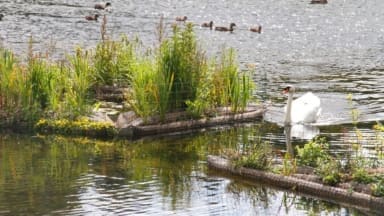
Biomatrix Water produce interesting floating modules, designed with a flexible substrate which are to be planted and suit a wide range of plant sizes. The floating islands support wildlife and providing habitat stepping stones for important local species. In addition, the suspended plant roots in the water provide additional habitat for species in the water, absorb nutrients and form beneficial relationships with micro-animals such as zooplankton, support complex food chains and can transform nutrients and other pollutants in the water body.
Donated by Biomatrix Water, the new floating ecosystems in the lake around the RHS Wisley Glasshouse, will provide an opportunity for observing wildlife and to collect data to help advance the scientific understanding of ecological processes.
The RHS Wisley Glasshouse Lake consists of 1.3 million gallons (six million litres) which acts as a reservoir for the garden and holds enough water to keep it supplied for an estimated two months. As well as providing a storage facility and a major feature in the landscape, the lake has been designed to encourage native wildlife.
Constructed from thermo fused high-density polyethylene, assembled with laser cut stainless steel joints, the Biomatrix Water floats will reportedly last for around 20 years. The tough structure gives the floating ecosystems a solid basis for supporting the media and plants, and can therefore withstand varying water levels or any strong water currents.
“I’m so chuffed to see the installation of Biomatrix Water Solutions at RHS Wisley. For what has been the most of a year long project that has now come to completion.” explained RHS Wisley, Level 4 Diploma Student Leo McEwen ACI Hort. “I look forward to gathering wildlife observations and ecology data going forwards – to name a few of the benefits these rafts bring” he added.
Floating ecosystems such as these are increasingly being used to transform hard-edged, waterbodies devoid of plants and/or wildlife, into living water parks, increasing public amenity and recreation. We look forward to following the progress of the new floating ecosystems at RHS Wisley.

